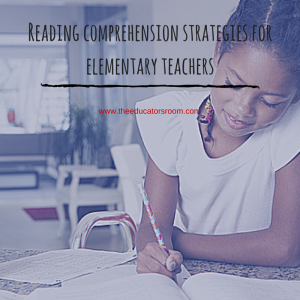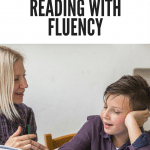 One of the most crucial skills that all students need to be able to steadily advance in school is reading comprehension. So many skills are dependent on how well a student can not only read, but comprehend what they are reading. Everyday we continually expose students to math word problems, graphs, science and social studies concepts through reading passages and expect them to perform well in that subject. However, if the reading comprehension skills are not solid, the student will not be able to demonstrate ability in these other subjects.
One of the most crucial skills that all students need to be able to steadily advance in school is reading comprehension. So many skills are dependent on how well a student can not only read, but comprehend what they are reading. Everyday we continually expose students to math word problems, graphs, science and social studies concepts through reading passages and expect them to perform well in that subject. However, if the reading comprehension skills are not solid, the student will not be able to demonstrate ability in these other subjects.
As an elementary teacher, there are three things I ALWAYS demonstrate over and over each day, in each subject that I feel enables my students to become better at comprehending what they are reading, no matter what the subject area.
1. PERUSAL is the first of several skills that all students need to learn how to do. If you are directing a student to read out of a book with pictures, direct the student to look through the pictures before even beginning to read the text. These picture clues serve as a guide to give the student a general idea of what they are getting ready to read and learn about. This works for fiction and nonfiction alike and it works for information gathering across curriculum. If you are directing reading in text without pictures, talk about the title, read the blurb and have students skim the first few pages of the first chapter. The students will be able to get a general idea of what they are getting ready to read about.
2. REITERATING THE 5Ws- Who, What, Where, When and Why are significant clues for reading that students need to master. Usually within the first two pages of a story students should be able to answer all of these questions and get a foundation for the story and as the story progresses, the answers may change depending on the grade level of text. Continually asking the students the 5Ws will keep them engaged in what they are reading and will also help them keep the flow of the story going, especially if you have reluctant readers or daydreamers who are challenged at keeping engaged during group time.
3. WRAP UP- When teachers are working with students through directed readings it is important to lead your students to wrap up what they have been doing as group time is coming to an end. Don’t just leave students hanging. I like to fill out a chart that details the book or chapter we have just completed. If you have something visual for the students to see, it not only allows them to keep track of what they have just read, it also allows them to review it the next time you are working out of the same material. This is also the perfect time to cross over with terminology, adding in character names, setting, conflict and solutions.
While these skills help in reading, they also work in math class.
When students are faced with a math concept, have them peruse what they are working on using these questions:
- Are the problems addition? Subtraction? Order of operations? Word problems?
- What do students remember from prior knowledge?
Allow students time to kick into gear what they are working on. I know my school day is crazy busy with very little down time and sometimes I expect students to switch gears as quickly as I do. I have to remember that their brains don’t run as quickly as mine does. They need a chance to get ready to learn. Allowing them to transition from one subject to another is very important in order for them to get into learning mode.
Using these same three techniques for other subject areas as well allows for a familiarity with what is expected from students. These techniques can also be used to allow students to become familiar with a content area test, instead of just expecting them to jump right in and can also be passed on to parents for them to use during reading time at home.





Leave a comment